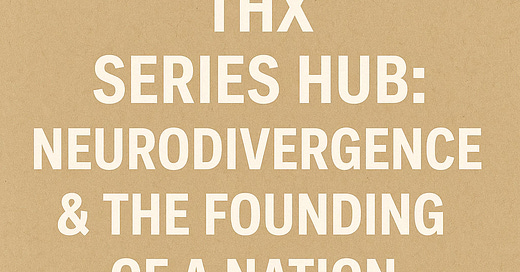THX Series Hub: Neurodivergence & the Founding of a Nation
Exploring how divergent thinking shaped the United States—and how our founding systems reflect both brilliance and bias.
This series applies the THX frameworks to the minds, motivations, and designs of America’s early architects. Rather than idealizing the Founders or condemning them outright, we explore how neurodivergence may have influenced their thinking—and how their systemic choices continue to shape (and constrain) our world.
✅ Published / In Progress
🔹 We Hold These Utilities to Be Self-Evident
Reimagines the Declaration of Independence through the lens of the 12 Utilities—arguing that true freedom requires not just rights, but reliable access, clarity, security, and value. A THX vision for modern human dignity.
🔹 Was the Constitution a Beginning or a Blueprint?
Unpacks whether the Founders saw the Constitution as a fixed moral foundation—or a living framework meant to adapt and evolve. Uses THX frameworks to examine systemic flexibility.
🔹 Built for Flourishing: The Constitution as a System of Human Experience
Reframes the U.S. Constitution not as a rigid rulebook, but as a flexible, emotionally intelligent system designed to promote stability, clarity, and adaptive trust across time.
🔹 The Enlightenment as a Neurodivergent Revolution
Redefines the Enlightenment not just as a philosophical shift—but as a moment of cognitive rebellion, fueled by divergent minds who prized reason, abstraction, and systems transformation.
🔹 What Guns Really Represent: Identity, Emotion, and the Stories We Tell Ourselves
While focused on modern issues, this post traces emotional logic and identity back to the 2nd Amendment—bridging historical intent and present polarization.
🔹 What If Neurodivergents Ruled the Country?
A speculative but grounded reimagining of national leadership through divergent logic—offering systems design shifts rooted in clarity, flexibility, and emotional intelligence.
🔹 The Neurodivergent Design of a Nation: A THX Reflection on the Founders
Explores how the Founders’ divergent ways of thinking shaped systems built for abstraction, contradiction, and change—and how that complexity both serves and limits flourishing today.
🔹 George Washington: The Embodied Discipline of Intentional Restraint
Analyzes Washington’s disciplined persona through the lens of emotional regulation, loss aversion, and micro-moment calibration. (Published)
🔹 Thomas Jefferson: Obsessive Clarity and the Architecture of Civic Design
Explores Jefferson’s idealism, contradiction, and obsession with order as neurodivergent traits with systemic impact. (Published)
🔹 John Adams: The Unshakable Mind of Principled Resistance
Examines Adams’ intense focus on justice, predictability, and principled design through Utilities like Security and Consistency. (Published)
🔹 Abigail Adams: The Brave Foresight of Emotional Intelligence
Spotlights Abigail Adams’ intuitive grasp of equity, dignity, and long-term relationship repair—through a lens of PERMAH, closure, and emotional insight most overlooked by her peers.
🔹 James Madison: The Structured Foresight of the Constitutional Mind
Analyzes Madison’s cognitive rigor and system obsession as a form of emotional security—designing for predictability, restraint, and the quiet prevention of chaos.
🔹 Benjamin Franklin: The Joyful Chaos of Polymathic Curiosity
Unpacks Franklin’s awe-driven utility mindset and emotional adaptability, celebrating him as a micro-moment master and a builder of public systems rooted in belonging and delight.
🔹 Alexander Hamilton: The Relentless Mind of Revolutionary Productivity
Interprets Hamilton’s visionary intensity through the THX lens—revealing how drive, speed, and consistency became his survival tools and systems legacy.
🔹 The Constitution as a Neurodivergent Blueprint
How ambiguity, modularity, and layered logic reflect a divergent cognitive design style. (Planned)
🔹 Fear of Loss and the Declaration of Independence
Applying Prospect Theory to the language and emotional logic of early American rebellion. (Planned)
🔹 The Founding Fathers and the Fear of Loss
Applies Prospect Theory to show how the Founders' obsession with preventing tyranny shaped their emotional and structural design of government. (Planned)
🚀 Coming Soon
What Franklin Knew About Micro-Moments
The art of diplomacy, storytelling, and system trust through tiny cues and reframes.Awe vs Fear: How Nationalism Hijacks Emotion
Exploring the emotional mechanics of the Admiration Equation—and how awe is turned into control.Is the U.S. Government Designed for Neurotypicals?
An honest inquiry into how accessible, flexible, or oppressive our foundational systems are for different minds.Constitutional Rigidity vs Adaptive Design
How the founding generation’s fears shaped a system that resists progress—and what design for flourishing might require now.
🔍 See Also
Disability, Autism & THX (Series Hub)
Personal systems and public design—how disability reframes dignity.THX Reflections & Personal Essays (Series Hub)
Where lived experience meets political philosophy and emotional design.
🧭 Explore More
Start at the Welcome & Navigation Guide to understand the THX frameworks. Or return to the full list of Series Hubs to explore other themes.
📬 Subscribe to follow the unfolding of this series. Questions, critiques, or counter-histories always welcome.




